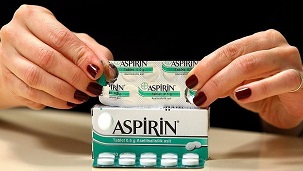George Washington University Cohort Study Shows That Aspirin Reduces Mortality Rates In Hospitalized Patients With Moderate COVID-19
Source: COVID-19 Drugs - Aspirin Mar 25, 2022 3 years, 10 months, 2 weeks, 12 hours, 23 minutes ago
COVID-19 Drugs: A new cohort study by researchers from George Washington University-USA has demonstrated that aspirin use is associated with reduced risk of mortality in hospitalized moderate COVID-19 patients.

Previous observational studies already showed that aspirin use may be associated with reduced mortality in high-risk hospitalized patients with COVID-19, but aspirin’s efficacy in patients with moderate COVID-19 has been not well studied.
https://www.thailandmedical.news/news/breaking-university-of-maryland-study-shows-that-aspirin-use-reduces-risk-of-both-mortality-and-mechanical-ventilation-in-hospitalized-covid-19-patien
The study team’s main aim was to assess whether early aspirin use is associated with lower odds of in-hospital mortality in patients with moderate COVID-19.
The research was designed as an observational cohort study of 112 269 hospitalized patients with moderate COVID-19, enrolled from January 1, 2020, through September 10, 2021, at 64 health systems in the United States participating in the National Institute of Health’s National COVID Cohort Collaborative (N3C).
Aspirin use was started within the first day of hospitalization.
The primary outcome was 28-day in-hospital mortality, and secondary outcomes were pulmonary embolism and deep vein thrombosis. Odds of in-hospital mortality were calculated using marginal structural Cox and logistic regression models. Inverse probability of treatment weighting was used to reduce bias from confounding and balance characteristics between groups.
Among the 2 446 650 COVID-19–positive patients who were screened, 189 287 were hospitalized and 112 269 met study inclusion. For the full cohort, Median age was 63 years (IQR, 47-74 years); 16.1% of patients were African American, 3.8% were Asian, 52.7% were White, 5.0% were of other races and ethnicities, 22.4% were of unknown race and ethnicity.
The study findings showed that in-hospital mortality occurred in 10.9% of patients. After inverse probability treatment weighting, 28-day in-hospital mortality was significantly lower in those who received aspirin (10.2% vs 11.8%; odds ratio [OR], 0.85; 95% CI, 0.79-0.92; P < .001).
Interestingly, the rate of pulmonary embolism, but not deep vein thrombosis, was also significantly lower in patients who received aspirin (1.0% vs 1.4%; OR, 0.71; 95% CI, 0.56-0.90; P = .004).
The
COVID-19 Drugs study also found that patients who received early aspirin did not have higher rates of gastrointestinal hemorrhage (0.8% aspirin vs 0.7% no aspirin; OR, 1.04; 95% CI, 0.82-1.33; P = .72), cerebral hemorrhage (0.6% aspirin vs 0.4% no aspirin; OR, 1.32; 95% CI, 0.92-1.88; P = .13), or blood transfusion (2.7% aspirin vs 2.3% no aspirin; OR, 1.14; 95% CI, 0.99-1.32; P = .06). The composite of hemorrhagic complications did not occur more often in those receiving aspirin (3.7% aspirin vs 3.2%
no aspirin; OR, 1.13; 95% CI, 1.00-1.28; P = .054). Subgroups who appeared to benefit the most included patients older than 60 years (61-80 years: OR, 0.79; 95% CI, 0.72-0.87; P < .001; >80 years: OR, 0.79; 95% CI, 0.69-0.91; P < .001) and patients with comorbidities (1 comorbidity: 6.4% vs 9.2%; OR, 0.68; 95% CI, 0.55-0.83; P < .001; 2 comorbidities: 10.5% vs 12.8%; OR, 0.80; 95% CI, 0.69-0.93; P = .003; 3 comorbidities: 13.8% vs 17.0%, OR, 0.78; 95% CI, 0.68-0.89; P < .001; >3 comorbidities: 17.0% vs 21.6%; OR, 0.74; 95% CI, 0.66-0.84; P < .001).
The study findings demonstrated that early aspirin use was associated with lower odds of 28-day in-hospital mortality of patients with moderate COVID-19.
The study team says that a randomized clinical trial that includes diverse patients with moderate COVID-19 is warranted to adequately evaluate aspirin’s efficacy in patients with high-risk conditions.
The study findings were published in the peer reviewed journal: JAMA Network Open.
https://jamanetwork.com/journals/jamanetworkopen/fullarticle/2790439
The study findings showed that hospitalized patients with moderate COVID-19 who were given aspirin early on in their treatment had a lower risk of dying compared to patients who were not given aspirin.
This is the third study and the culmination of 15 months of work looking at aspirin use in hospitalized COVID-19 patients by the same study team.
Lead researcher, Dr Jonathan Chow, from the Department of Anesthesiology and Critical Care Medicine at George Washington University School of Medicine and Health Sciences told Thailand
Medical News, “Our study team continued to find that aspirin use is associated with improved outcomes and lower rates of death in hospitalized patients. What's more, it's low cost and readily available, which is important in parts of the world where more expensive therapeutics might not be as accessible."
The study team found a 1.6% reduction in mortality when aspirin was given within the first day of hospitalization in patients with moderate disease severity and that patients were less prone to forming blood clots. They also found that elderly patients and patients with one or more comorbidities especially benefit from early aspirin therapy.
The director of the Computational Biology Institute (CBI) at George Washington University, the organization that helped assemble and input GW's data into the NIH database and curate the dataset into a usable format for the statistical analysis, Keith Crandall added, "The study is vital to providing physicians and patients effective and accessible COVID-19 treatments to help reduce in-hospital mortality rates and help people recover from this potentially devastating disease."
The study team had been focused on this topic since the beginning of the pandemic. Their first study published in April 2021 and the second study published in November 2021.
https://pubmed.ncbi.nlm.nih.gov/33093359/
https://pubmed.ncbi.nlm.nih.gov/34455688/
Thailand
Medical News had also covered on another study by researchers from Michigan State University also showed that Aspirin usage was reduced with lower morality risk in hospitalized patients.
https://www.thailandmedical.news/news/american-study-confirms-that-aspirin-use-is-associated-with-decreased-mortality-risk-in-covid-19-patients
For the latest on
COVID-19 Drugs, , keep on logging to Thailand
Medical News.
Read Also:
https://www.thailandmedical.news/news/breaking-american-and-german-study-shows-that-heartburn-drug-famotidine-with-aspirin-prevents-covid-19-disease-severity-and-mortality
